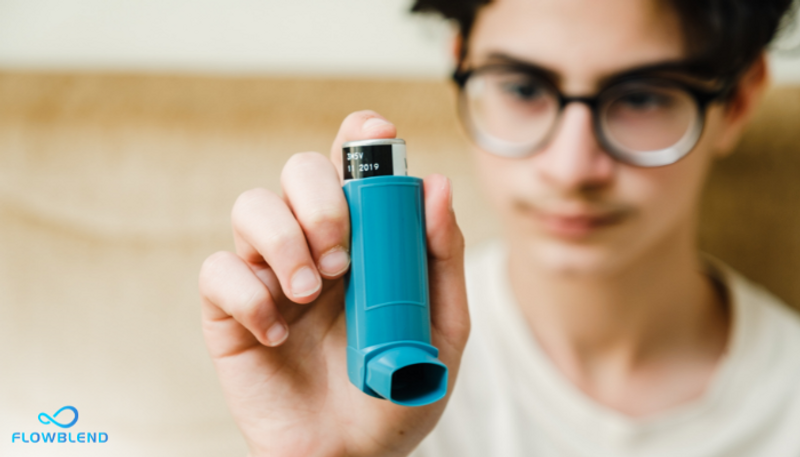In the fast-paced world we live in, managing nicotine withdrawal can be a challenge. Many individuals, especially those accustomed to taking supplements to influence their mood or well-being, are seeking convenient and enjoyable methods to cope with these issues. One such solution gaining popularity is the nicotine inhaler. We will examine the ins and outs of nicotine inhalers in this piece, learning what they are, why they are significant, how they operate, and the advantages they provide.
Ready to take control of your nicotine withdrawal and stress management? Discover the ultimate solution with FlowBlend Nicotine Inhalers. Experience convenience, satisfaction, and a healthier way to cope. Try FlowBlend today and reclaim your well-being!
What Is A Nicotine Inhaler?
A nicotine inhaler is a portable device designed to deliver controlled doses of nicotine vapor into the user's lungs. It is a smokeless and discreet alternative to traditional tobacco products. Nicotine inhalers are typically used as part of a smoking cessation program to help individuals quit smoking while managing their nicotine cravings.1

Unlock Your Potential With FlowBlend
|
Why Is A Nicotine Inhaler Important?
Nicotine inhalers play a crucial role in helping people quit smoking and manage nicotine withdrawal. Their importance lies in their ability to provide a safer and more controlled method of nicotine intake compared to smoking cigarettes. By using a nicotine inhaler, individuals can gradually reduce their nicotine dependence without exposing themselves to harmful tobacco smoke.
How Does A Nicotine Inhaler Work?
Nicotine inhalers work by vaporizing nicotine liquid stored in a cartridge. When a user inhales through the device, they draw in a nicotine vapor that is absorbed into their bloodstream through the lungs. This provides a rapid but controlled delivery of nicotine, helping to alleviate cravings and withdrawal symptoms without the harmful effects of smoking.2
What Are The Benefits Of Using A Nicotine Inhaler?
Using a nicotine inhaler offers several benefits for individuals seeking to manage nicotine withdrawal and stress:
Smokeless Alternative
Nicotine inhalers are smokeless, eliminating the harmful chemicals associated with tobacco smoke.
Controlled Nicotine Intake
Users can control the amount of nicotine they consume, making it easier to gradually reduce their dependence.3
Discreet and Portable
Nicotine inhalers are compact and can be used discreetly in various settings, allowing for on-the-go stress management.
Effective Craving Relief
The rapid nicotine delivery helps alleviate cravings and withdrawal symptoms effectively.4
Is A Nicotine Inhaler Bad For You?
When used as directed, nicotine inhalers are generally considered a safer alternative to smoking traditional cigarettes. However, it's essential to understand that nicotine is an addictive substance, and using a nicotine inhaler is not entirely risk-free. Here are some key points to consider:
- Safer Than Smoking: Nicotine inhalers do not produce harmful tar and many of the toxic chemicals associated with burning tobacco, making them a less harmful option for nicotine intake.5
- Nicotine Addiction: Nicotine, whether from a cigarette or an inhaler, can be addictive. Users should be cautious about developing a dependence on nicotine inhalers.6
- Consult a Healthcare Provider: If you have concerns about using a nicotine inhaler or its potential effects on your health, it's advisable to consult with a healthcare provider for personalized guidance.
How Long Can You Use A Nicotine Inhaler?
The duration of nicotine inhaler use can vary from person to person and depends on individual needs and goals. Here are some considerations:
Short-Term Use
Nicotine inhalers are often used as part of a smoking cessation program, typically for 12 weeks. However, some individuals may use them for a shorter period to manage specific situations or cravings.7
Gradual Reduction
Many users gradually reduce the frequency of inhaler use over time to decrease nicotine intake and eventually quit using the inhaler altogether.8
How Many Times A Day Can You Use A Nicotine Inhaler?
The recommended frequency of nicotine inhaler use can vary, but here are some general guidelines:
- As Needed: Nicotine inhalers are designed for on-demand use when cravings for nicotine occur. You can use them when you feel the urge to smoke or when you need to manage stress.
- Avoid Overuse: It's important not to overuse the inhaler to prevent excessive nicotine intake. Follow the instructions provided with the product or consult a healthcare provider for personalized guidance.
Are Nicotine Inhalers Safer Than Vaping?
Comparing nicotine inhalers to vaping (e-cigarettes) is a common question. Here's a comparison of their safety:
Nicotine Inhalers
Nicotine inhalers are considered a safer option than vaping because they do not produce harmful chemicals associated with e-cigarette aerosols, such as formaldehyde and acetaldehyde.
Vaping Risks
Vaping is associated with potential health risks, including lung issues and the inhalation of harmful substances. Vaping products also come in various flavors that may appeal to younger users, raising concerns about youth vaping.9
Consult a Healthcare Provider
If you are considering switching from vaping to a nicotine inhaler or have questions about the relative safety of these products, consult a healthcare provider for guidance.
How Many Puffs In A Nicotine Inhaler?
Nicotine inhalers typically provide around 4 milligrams of nicotine per cartridge, and the number of puffs in a cartridge can vary. Here are some general points to consider:
Varied Puff Count
The number of puffs in a nicotine inhaler cartridge can range from 80 to 120, depending on the brand and design of the device.
Puff Duration
Each puff from a nicotine inhaler is relatively short, similar to inhaling from a regular inhaler used for respiratory conditions.
Check Product Label
To determine the exact puff count for a specific nicotine inhaler product, refer to the information provided on the product label or packaging.
Final Thoughts On Nicotine Inhaler
Nicotine inhalers are a valuable tool for individuals seeking to manage nicotine withdrawal and stress effectively. While they offer a safer alternative to smoking, it's essential to use them responsibly and, ideally, under the guidance of a healthcare professional.
At FlowBlend, we understand the challenges of nicotine cessation, and we're here to support your journey towards a healthier, smoke-free life. Our CBD and Nootropics pouches are specially designed to assist nicotine users in their quest to quit. These innovative products can complement your efforts with a holistic approach to managing cravings and stress.
Ready to take control of your nicotine journey and embrace a smoke-free future? Discover the power of our CBD and Nootropics pouches at FlowBlend. Start your journey towards a healthier, stress-free life today. Your well-being is our top priority, and we're here to support you every step of the way. Explore our range now and make a commitment to a nicotine-free you.
Frequently Asked Questions About Nicotine Inhaler
Can nicotine inhalers help me quit smoking?
Nicotine inhalers are often used as part of a smoking cessation program and can be an effective aid in quitting smoking. They provide a controlled way to manage nicotine cravings during the quitting process.
Are nicotine inhalers safe?
Nicotine inhalers are considered safer than smoking traditional cigarettes because they do not produce harmful tar and chemicals associated with combustion. However, they are not entirely risk-free, and their safety should be discussed with a healthcare professional.
Can I use a nicotine inhaler to reduce stress even if I don't smoke?
Yes, nicotine inhalers can be used by individuals who do not smoke but are seeking stress relief. The controlled delivery of nicotine may provide a calming effect. However, it's essential to use them responsibly and discuss with a healthcare professional if you have any concerns.
What are the potential side effects of using a nicotine inhaler?
Common side effects of nicotine inhalers may include throat or mouth irritation, coughing, and hiccups. These side effects are usually mild and temporary. If you experience severe or persistent side effects, consult a healthcare provider.
Do Nicotine Inhalers Have Flavors?
Nicotine inhalers typically do not come in a variety of flavors like e-cigarettes (vaping products). They are designed to provide a straightforward nicotine delivery without additional flavorings.
Can Nicotine Inhalers Help with Smokeless Tobacco Cessation?
Nicotine inhalers are primarily designed to assist individuals in quitting smoking. However, they may also be beneficial for those looking to quit smokeless tobacco products, such as chewing tobacco or snuff. Consult with a healthcare provider for guidance tailored to your specific situation.
Can Nicotine Inhalers Be Used in Non-Smoking Areas?
Nicotine inhalers are generally permitted in non-smoking areas because they do not produce harmful secondhand smoke or aerosols. However, it's advisable to respect local policies and regulations regarding nicotine inhaler use in public places.
Can Nicotine Inhalers Cause Allergic Reactions?
While allergic reactions to nicotine inhalers are rare, some individuals may be sensitive to the components of the device. If you experience symptoms such as rash, itching, swelling, or difficulty breathing after using a nicotine inhaler, discontinue use and seek medical attention.
Do Nicotine Inhalers Expire?
Nicotine inhalers have an expiration date printed on their packaging. It's important to check this date and avoid using inhalers that have expired, as the effectiveness of the product may diminish over time.
Can Nicotine Inhalers Be Used with Other Smoking Cessation Aids?
Nicotine inhalers can be used in conjunction with other smoking cessation aids, such as nicotine gum or patches, under the guidance of a healthcare provider. Combining different methods may enhance your chances of successfully quitting smoking or managing nicotine cravings.
Are Nicotine Inhalers Environmentally Friendly?
Nicotine inhalers are generally considered more environmentally friendly than traditional cigarettes because they do not produce cigarette butts or harmful smoke. However, the environmental impact of the device's components should be considered, and proper disposal methods should be followed.
Sources:
- Hjalmarson, A., Nilsson, F., Sjöström, L., & Wiklund, O. (1997). The nicotine inhaler in smoking cessation. Archives of Internal Medicine, 157(15), 1721–1728. https://pubmed.ncbi.nlm.nih.gov/9250233/
- Nicotine Inhaler. (n.d.). Myhealth.alberta.ca. Retrieved September 14, 2023, from https://myhealth.alberta.ca/Health/pages/conditions.aspx?hwid=aa153588
- Benowitz, N. L., & Henningfield, J. E. (2013). Reducing the nicotine content to make cigarettes less addictive. Tobacco Control, 22(suppl 1), i14–i17. https://doi.org/10.1136/tobaccocontrol-2012-050860
- Casella, G., Caponnetto, P., & Polosa, R. (2010). Therapeutic advances in the treatment of nicotine addiction: present and future. Therapeutic Advances in Chronic Disease, 1(3), 95–106. https://doi.org/10.1177/2040622310374896
- Quit smoking medicines are much safer than smoking | Quit Smoking | Tips From Former Smokers | CDC. (2022, January 11). Www.cdc.gov. https://www.cdc.gov/tobacco/campaign/tips/quit-smoking/quit-smoking-medications/3-reasons-to-use-medicines-when-you-quit/quit-medicines-are-safer-than-smoking/index.html
- National Institute on Drug Abuse. (2021, April 12). Is nicotine addictive? National Institute on Drug Abuse. https://nida.nih.gov/publications/research-reports/tobacco-nicotine-e-cigarettes/nicotine-addictive
- Giulietti, F., Filipponi, A., Rosettani, G., Giordano, P., Iacoacci, C., Spannella, F., & Sarzani, R. (2020). Pharmacological Approach to Smoking Cessation: An Updated Review for Daily Clinical Practice. High Blood Pressure & Cardiovascular Prevention, 27(5), 349–362. https://doi.org/10.1007/s40292-020-00396-9
- Begh, R., Lindson-Hawley, N., & Aveyard, P. (2015). Does reduced smoking if you can’t stop make any difference? BMC Medicine, 13(1). https://doi.org/10.1186/s12916-015-0505-2
- News in Health. (2020, April 27). The Risks of Vaping. NIH News in Health. https://newsinhealth.nih.gov/2020/05/risks-vaping

